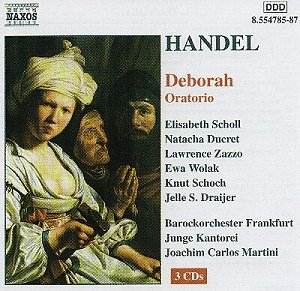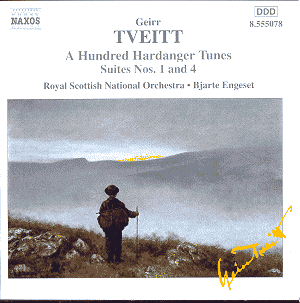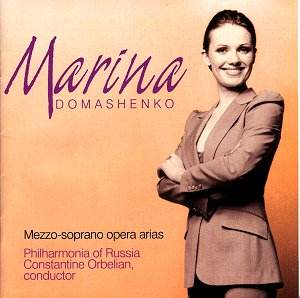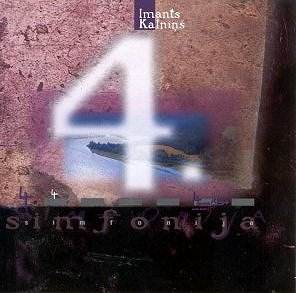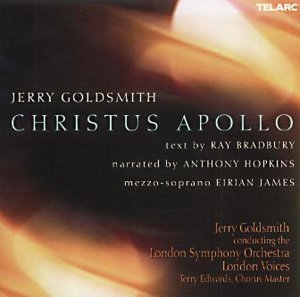 Composer: Jerry Goldsmith
Composer: Jerry Goldsmith
Works: Christus Apollo, Music for Orchestra, Fireworks
Performers: Anthony Hopkins (narrator), Eirian James (mezzo-soprano), London Voices, London Symphony Orchestra
Recording: TELARC CD-80560
Label: Brilliant
Jerry Goldsmith, renowned primarily for his prolific contributions to film music, ventures into the concert hall with a disc that showcases three distinct works, each reflecting different epochs and emotional landscapes of his career. This compilation presents an intriguing juxtaposition of Goldsmith’s artistic evolution, from the stark, emotionally charged “Music for Orchestra” to the celebratory exuberance of “Fireworks,” all anchored by the ambitious cantata “Christus Apollo,” which merges literary and cosmic themes under the auspices of Ray Bradbury’s text.
“Music for Orchestra,” composed in 1970, emerges from a turbulent personal period in Goldsmith’s life, a fact that resonates deeply within the music’s fabric. The piece, an eight-minute exploration of 12-tone techniques, conveys a sense of anguish and volatility. Critics may hear echoes of his film score for “Planet of the Apes” in the aggressive dissonance and stark orchestral textures, a testament to Goldsmith’s ability to distill personal turmoil into a musical language that, while disjointed, pulses with raw emotion. The London Symphony Orchestra, under Goldsmith’s own baton, delivers a tight, vigorous interpretation, capturing the piece’s inherent violence and intensity while maintaining clarity amid its complex counterpoint.
The centerpiece of the album, “Christus Apollo,” is a more ambitious work written in 1969, comprised of four movements and featuring a substantial orchestral and choral component. The collaboration with Bradbury infuses the score with a narrative depth that complements its intricate musical architecture. Here, Goldsmith employs a rich tapestry of sound that evokes the vastness of the cosmos, echoing the choral textures reminiscent of Ligeti, particularly in the ethereal, floating harmonies that suggest the infinity of space. Eirian James’s mezzo-soprano performance is strikingly emotive, navigating the challenging vocal lines with an intensity that highlights the text’s philosophical musings on humanity’s relationship with the divine. Anthony Hopkins’s narration, delivered with characteristic gravitas, adds a layer of interpretative weight, his voice guiding the listener through Bradbury’s ambitious lyrical landscape.
The album concludes with “Fireworks,” a celebratory piece capturing Goldsmith’s reflective nostalgia for his Los Angeles upbringing. The orchestration is bright and effervescent, contrasting sharply with the preceding works. It serves not only as a musical reflection of joy but also as a stylistic pivot back toward the more familiar territory of Goldsmith’s film scoring, characterized by sweeping melodies and vibrant orchestral colors. The performance here is equally buoyant, with the LSO exhibiting a playful energy that encapsulates the spirit of Goldsmith’s childhood recollections.
The sonic quality of this recording is exemplary, capturing the full dynamic range and intricate details of Goldsmith’s orchestration. The transition from the starkness of “Music for Orchestra” to the lush textures of “Christus Apollo” and finally to the jubilant “Fireworks” is seamless, with each piece benefiting from the clarity and richness afforded by the SACD format. The engineering allows the listener to appreciate the interplay of voices and instruments, particularly in the choral sections, where the London Voices shine brightly.
This disc stands as a significant document of Goldsmith’s multifaceted artistry, highlighting works that have long awaited their moment in the spotlight. The historical context of “Christus Apollo” as a reflection of both the space age and the artistic climate of the 1960s adds layers of meaning that resonate even in contemporary times. For those familiar with Goldsmith’s film scores, this collection represents an opportunity to engage with the composer’s more ambitious concert works, revealing the depth and breadth of his musical language. The listener is encouraged to approach the text with an open mind, allowing the music to speak on its own terms rather than being overshadowed by the philosophical aspirations of the words. As a synthesis of human emotion and celestial wonder, this album will undoubtedly appeal to both devotees of Goldsmith and newcomers alike, marking a pivotal moment in the growing appreciation of film composers within the classical canon.
